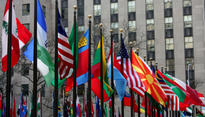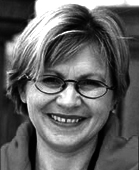FNI briefs Norway’s PM in Shanghai

FNI Director Geir Hønneland briefed Norway’s Prime Minister Erna Solberg and Foreign Minister Børge Brende during their official visit to China in April.

FNI Director Geir Hønneland briefed Norway’s Prime Minister Erna Solberg and Foreign Minister Børge Brende during their official visit to China in April.

FNI Senior Policy Analyst Christian Prip has been given the task to conduct an independent review of the International Whaling Commission.

Researchers from FNI and the K.G. Jebsen Centre for the Law of the Sea are in New York this week to give input to the UN on the use of marine resources in areas beyond national jurisdiction.

FNI Director Geir Hønneland gave a talk on Russia and ‘how to understand Russians’ at a recent debate in Bergen.

FNI research fellow Pål Wilter Skedsmo defends his PhD thesis ‘Europeanizing Armenia. Assemblages of environmental rights and development in Post-Soviet Armenia’.
‘Irreversible’ changes to the earth provide striking evidence of new epoch, experts suggest, thus rebuking the critics claiming that the Anthropocene is mostly about politics, not science.
The book EU Climate Policy, written by FNI researcher Jørgen Wettestad and Elin Lerum Boasson at the University of Oslo, has sold well and is now available in paperback.
Listening to debates about the benefits and drawbacks of bioenergy and biofuels is usually a mixed experience, with advocates of both sides slinging mud and calling each other’s kettles black.

Anne Kristin Sydnes died 3 March, from cancer. She was 60 years old. Anne Kristin worked at FNI from 1981until 1998. Her research focused on energy, north-south issues and climate policy. Her personality made a lasting impression on everybody she met. We mourn the loss of a good colleague and friend.
After tough negotiations between ministers and only a tiny majority, the ETS reform process now enters its final, crucial phase.

A plea to extend the Polar Code was this week rejected in an International Maritime Organization (IMO) sub-committee meeting, making the road ahead steeper for those advocating tighter environmental regulations in the Polar Regions.

The EU Parliament has voted for a more ambitious post-2020 emissions trading system (ETS). However, major reform proposals were also rejected – and tough negotiations still remain.

The independent social science institutes in Norway are both productive and relevant, according to a recent evaluation. The report praises the Fridtjof Nansen Institute for its prestigious scientific publications, its strategic importance and its high level of policy relevance.

The Ministry of Climate and Environment has asked FNI research professor Ole Kristian Fauchald to study the legal ramifications of Norway’s current approach to wolf management.

As Finland gets ready to assume the chairmanship of the Arctic Council this spring, it must bear in mind the need for reform and new thinking.

A dispute between Norway and the EU on commercial fishing rights to snow crab has escalated significantly, challenging Norway’s current Svalbard policy.
A large, new marine reserve in the Arctic Ocean – is it at all foreseeable? What would be the consequences for the Arctic states that control most of these waters today? FNI researchers will find these issues, and many more, on the agenda at this year’s Arctic Frontiers conference.

Salmon farming is a booming business in Norway and both the business and public authorities want expansion. However, a new research report concludes that current efforts at finding environmentally sound ways to expand meet with legal and constitutional challenges.

Research from the Fridtjof Nansen Institute is mentioned in one of the ten most read NRK news articles in 2016 – and is also included on a ‘top 100’ list of the most discussed scientific articles globally.

Following years of standstill, China and Norway this week ‘normalised’ their diplomatic relations and agreed to reopen negotiations on a free trade agreement. Good news for Chinese–Norwegian relations – but could it be bad for the environment?